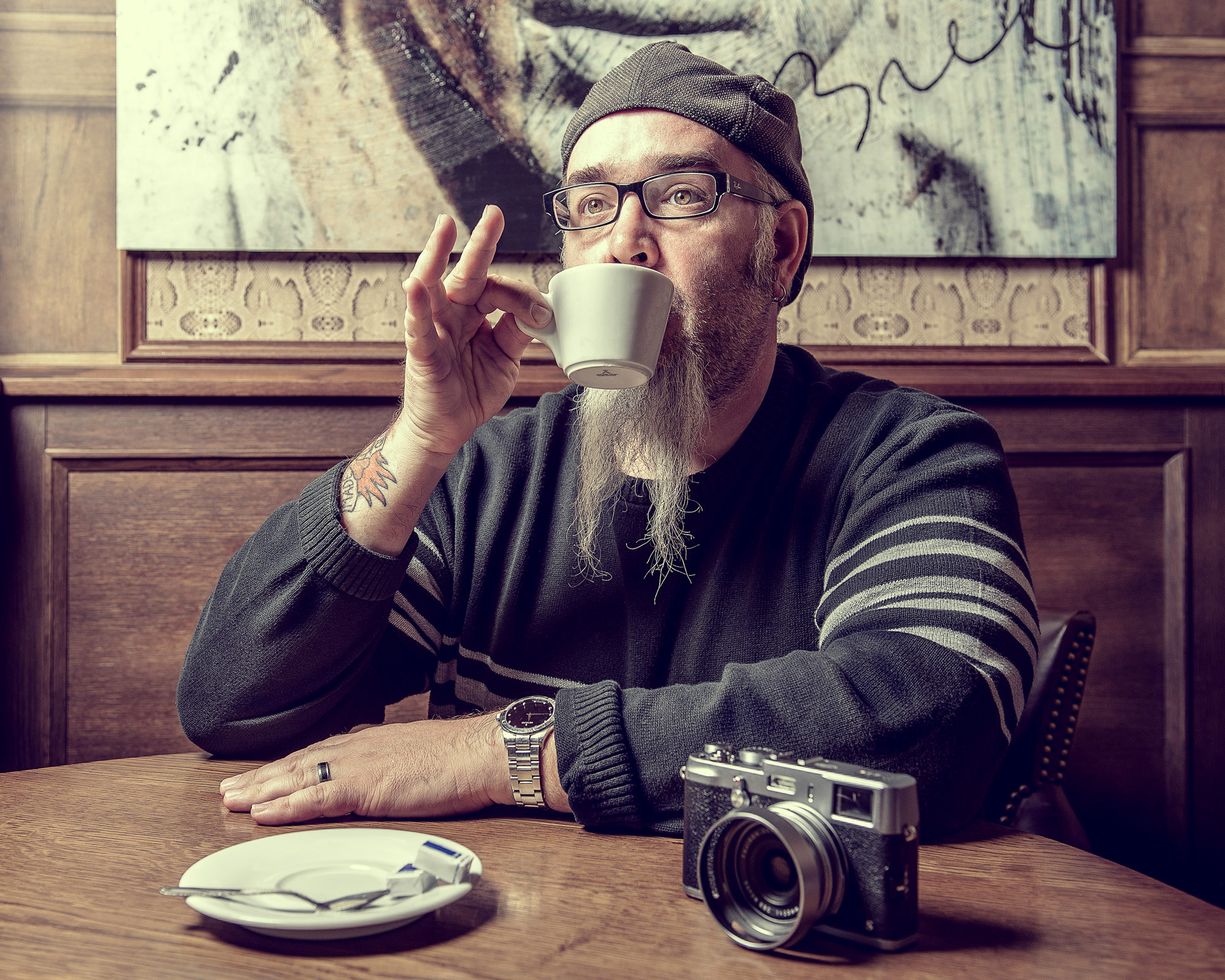
- Interview by Ryan & Tina Essmaker August 20, 2013
- Photo by Antoine Willaeys
Zack Arias
- photographer
Zack Arias is an editorial and commercial photographer based in Atlanta, Georgia. After working in the music industry for the past seven years, Zack has branched out into editorial and advertising work. His greatest talents are his ability to work with a variety of people and getting nervous subjects to relax in front of the lens. Zack and his wife, Meghan, live in Atlanta and, between the two of them, they have four boys.
Interview
Describe your path to becoming a photographer.
I got on the yearbook staff as a photographer back in high school. I enjoyed it, but I mostly liked it because the camera was a hall pass for me. I could skip class and roam around and say, “Oh, I’m doing something for yearbook,” and teachers just accepted it.
After high school, I went off to college because that was the expectation my family had for me. Unfortunately, I didn’t do very well and my grades dropped. I was almost failing out of college, but tried to improve my GPA by taking a Photography 101 class. At that time, I hadn’t done anything with photography outside of high school yearbook. One day after the class, my professor pulled me aside and said, “I think you have a talent in photography and if you don’t do something with it, you’re wasting it.” That was the first time anyone had ever said anything like that to me. No one had ever told me I had a talent or that I was particularly good at something. I asked her what I should do because I never, ever thought photography could be a career path. She told me to transfer into the art program at the University of Georgia and become a photographer. I didn’t have any better plans, and it sounded like a cool thing to do, so I did it.
I ended up failing out of UGA’s art program within a year. I was not an ar-teest—I wanted to do photography as a job—but everyone looked at me like I was a whore. I wanted to make money with photography while the other students wanted to make art. I didn’t do well with art: I didn’t take pictures of naked girls laying on headstones, or talk about the “juxtaposition of life and death” and the “cold, hard granite of the headstone.” It sucked.
After I failed out of UGA, I moved back in with my dad and became a bitter, lonely, broke twenty-something with zero direction in my life. In 1995, I had had it with everything—it was either take a bullet or take a trip. So I bought an old Volkswagen bus, and my dad and I fixed it up. I sold everything I had and hit the road for six months. When I came back from that trip, I knew I had to do something.
I’m the type of person who needs to be taught with hands-on instruction and real-time feedback, so I started looking at schools again. I looked at Portfolio Center, the Art Institute, Brooks, and RIT, but they were really expensive and I didn’t want to go into massive amounts of debt. Eventually, I found a place called Gwinnett Tech that was just down the road from my dad’s house. It was a two-year technical college that offered programs for things like welding, plastic injection molding, auto body work, and, oddly enough, commercial photography. It was $300 a quarter; the other schools I looked at would have cost $300 just for parking. The teachers there taught part-time and were working photographers the rest of the time; it was very technical and commercial-based; it was close to me; and it was affordable. I said to myself, “This is it.” I started out as a classic underachiever, but once I got on track and hit my stride, I graduated with a 3.8 GPA and had the best portfolio in my class.
After graduating from Gwinnett Tech, I became a studio assistant, which led to me to Dallas, Texas, where I became the manager of a big commercial studio for about three years. While in Texas, I also tried to get my freelance career going, but I was so driven to make it happen that it became my only priority, and everything else fell apart. Photography will take everything from you: it will take your time, your money, and your relationships. It’ll suck you in, and you can become so driven by the craft and the industry that all the other important things in your life take a back seat to it. I had gone into a lot of debt for camera gear, I was in a bad place financially, and my family life had come crashing down. Around the end of 2001, I left Texas and moved my three-year-old son and I into my brother’s basement back in Atlanta. I had photography equipment that I still owed money on by way of high-interest credit cards, so when my car would break down or I’d be short on rent, I’d have to sell a lens or something to pay my bills. Pretty soon all of my gear was gone and I thought my photography career was over.
Wow! How did you get from that point to where you are now?
I had gotten a job working at Kinko’s when my dear friend Marc Climie, who did wedding photography at the time, called me up and said, “Things are crazy and I need a second shooter. Can you do it?” I had never wanted to shoot weddings. I had a really bad attitude about it: I considered it to be low-hanging fruit and I wanted to do real photography. But life has a funny sense of humor, so my re-introduction to photography was doing weddings and family portraits.
In October 2003, Marc bought me a Nikon D100. It was a Friday: he set me loose on a wedding and it was the greatest day of my life. I felt alive again; it was as if I had been under water and had finally been lifted up so I could breathe. I said to myself, “This is what I’m supposed to do.”
The next week, I put my notice in at Kinko’s. On my last day there, I printed up business cards and all the other marketing materials I would need. All my coworkers were taking bets, saying things like, “Give him 30 days and he’ll be back.” I started hustling and shooting. Marc let me borrow his gear for months until I could start buying my own again. I’d shoot a wedding with him and say, “I’ve got two shoots coming up this week. Can I borrow your 17–35 lens?” or, “Can I borrow the 80–200?” I had to make it work or I would have to go back to Kinko’s. That was a huge motivation for me.
“…my professor pulled me aside and said, ‘I think you have a talent in photography and if you don’t do something with it, you’re wasting it.’ That was the first time anyone had ever said anything like that to me. No one had ever told me I had a talent or that I was particularly good at something.”
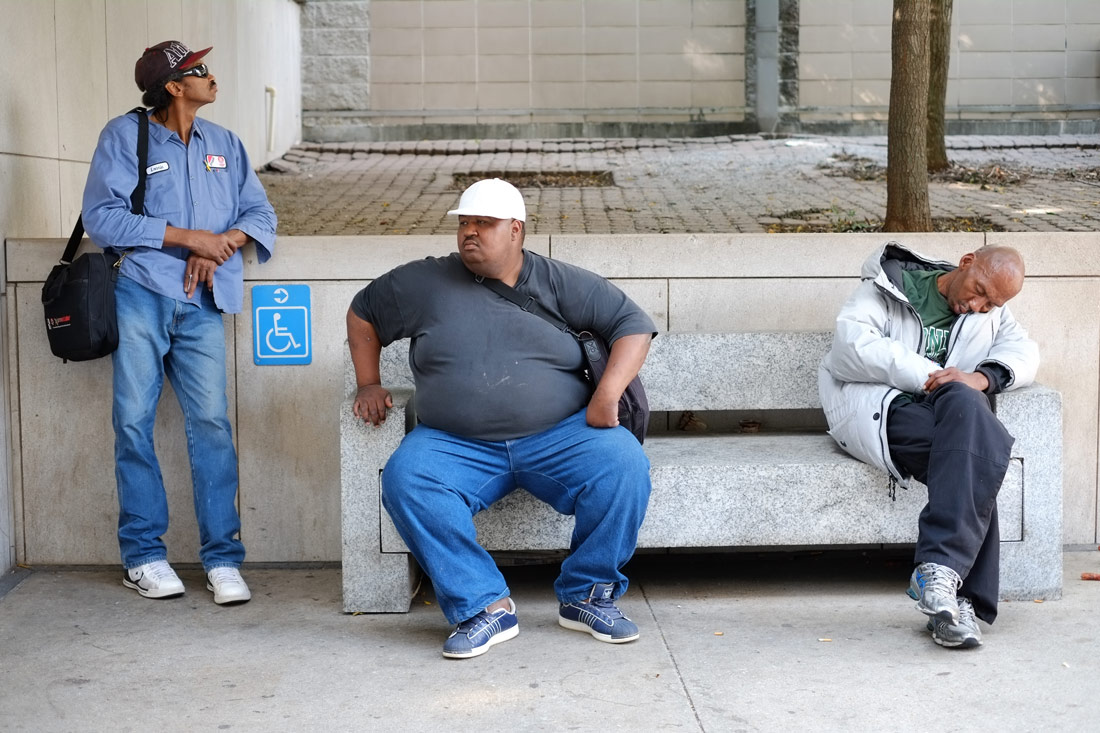
Was that the “aha” moment for you, when you knew you wanted to focus on photography?
There’s an old saying: “Photography calls many, but chooses few.” Initially, I knew that I had been called to photography, but I decided that it hadn’t chosen me. My plan was to get into the management program at Kinko’s, maybe become a district manager or something, and just make a career out of that. Shooting that wedding with Marc was when I knew that I was supposed to be a photographer, and after that, I ended up second-shooting with him for seven years.
There were other kinds of “aha” moments after that. I used to subscribe to the philosophy of “fake it till you make it.” When I talked to people, I embellished what I was working on to make it sound bigger and more important than it really was. I wanted them to think, “Wow, this guy really knows what he’s doing and he’s working on really great projects.” I wasn’t, but I wanted people to think I was so they’d hire me. After I lost everything, I decided I wasn’t going to be proud, arrogant, or overconfident anymore—I was just going to be me. If I was shooting pictures of toilets that day, then I would just be honest with people and say, “Yep, I’m shooting pictures of toilets. That’s what I’m doing.” Whatever gear I had was the gear I was going to use—I wasn’t going to go into debt again. If I was struggling, I wasn’t going to be the guy staring at his navel saying, “Woe is me.” I decided to keep my head up, my hand to the plough, and be busy at work. Having that kind of attitude made a big difference in my life, career, and business.
Have you had any mentors along the way?
My first mentor was Steve Schaefer. He was one of my teachers at Gwinnett Tech and an old-school editorial photographer who didn’t take shit from anybody. He was kind of like a boot camp drill sergeant: he was grumpy, he’d yell at you, and he could be a real pain in the ass. But when you showed him a picture that he was happy with, it was like winning gold at the Olympics—you just couldn’t believe it. He’s still a big influence on me to this day.
I’ve had several more mentors along the way and wouldn’t be where I am without all of them. The number one person I look up to is probably Joe McNally and there’s also Gregory Heisler—I hope to be half of what Joe and Gregory are at some point in my life. While I was in Dallas, Marc Anderson, who I assisted, and Holly Schwartz were important to me. Marge and Scott Ely, and Michelle Vaughn were also all inspirational.
“I felt alive again; it was as if I had been under water and had finally been lifted up so I could breathe. I said to myself, ‘This is what I’m supposed to do.’”
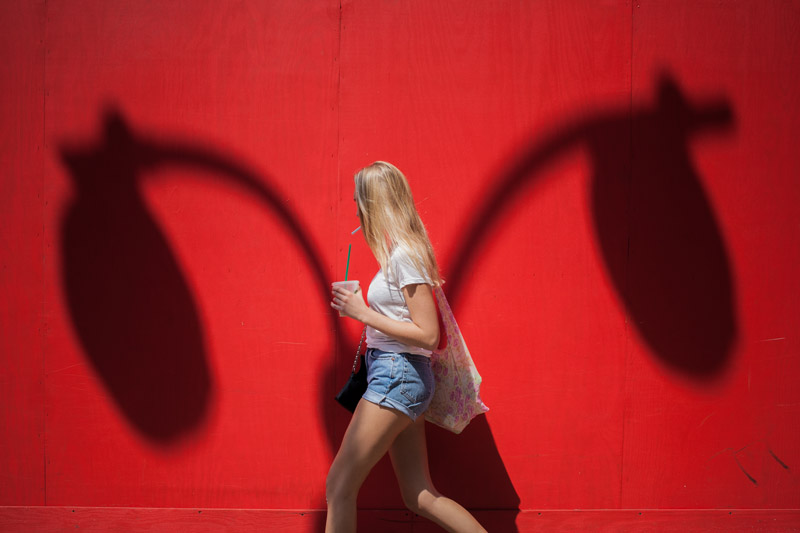
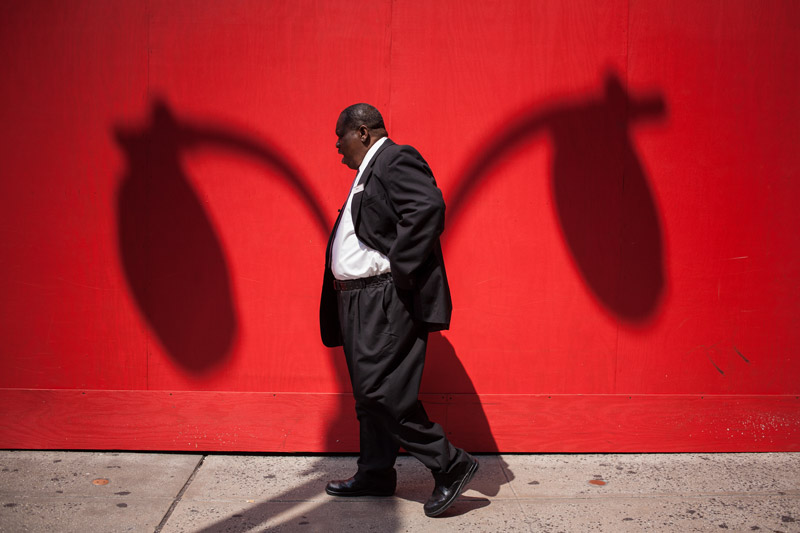
From what you’ve told us, it sounds like you’ve taken a lot of risks in your career.
Sometimes I wonder if I’m a risk-taker or if I’m just stupid (laughing). I think I’m a mix of both. I take risks in being honest with people and in how I communicate with subjects in front of my camera. There are times when I’ll take risks with what I ask of a client during a shoot or with the kinds of locations I shoot in, but that’s because I know it will make a better photograph. These are folks who are happy just standing and looking at the camera—maybe smiling, maybe not—and taking a picture. As long as it’s recorded on the camera, they’re fine. For me, though, while it might be a very simple photograph, I have to get something stronger than the person just standing there, waiting for the process to be done.
As I move along in the industry, I’m starting to get slightly more high-profile people in front of my camera—people who have different personalities than the average person off the street. Sometimes I’m only given 10 minutes to take a photo and I have to get this person to trust me. I had a shoot a few years ago with two personalities in front of my camera. They got into a bit of an argument and one of them was a breath from walking off the set. My client was there, along with a crew, and a lot was riding on me getting the picture. Even though I’m just the photographer—and no one gives a shit about the photographer—I had to step into the situation and get everything under control in order to get the job done.
Saying no to certain jobs is another risk. I think, “I need the money, but that’s just not a job I want to do.” Sometimes it’s not the type of work I want to be focused on or maybe it’s not under the terms I want or the client is asking too much. Other times I have to say no, even when I don’t want to. There have been clients I’ve wanted to take pictures for, but the pay is horrible and they want all the rights. Sure, I want to take the pictures, but I’m cutting every other photographer off at the knees if I take that job—and if I did it, I wouldn’t been able to sleep at night. Another photographer will come in right behind me and take it, but that’s on them. It’s the nature of the beast.
Are your family and friends supportive of what you do?
My family is very supportive. When I have to travel, I take my wife, Meghan, with me as much as possible because she has put her whole music career on hold as my career has moved forward. She’s at home with four boys, a dog, and a cat, and she holds all of that together. There are times when I say to her, “I’m taking a trip to this amazing place and I want you to come with me,” and that’s when our friends and family all come together to take care of the house and kids. I cannot do what I do without my wife or the friends and family around us.
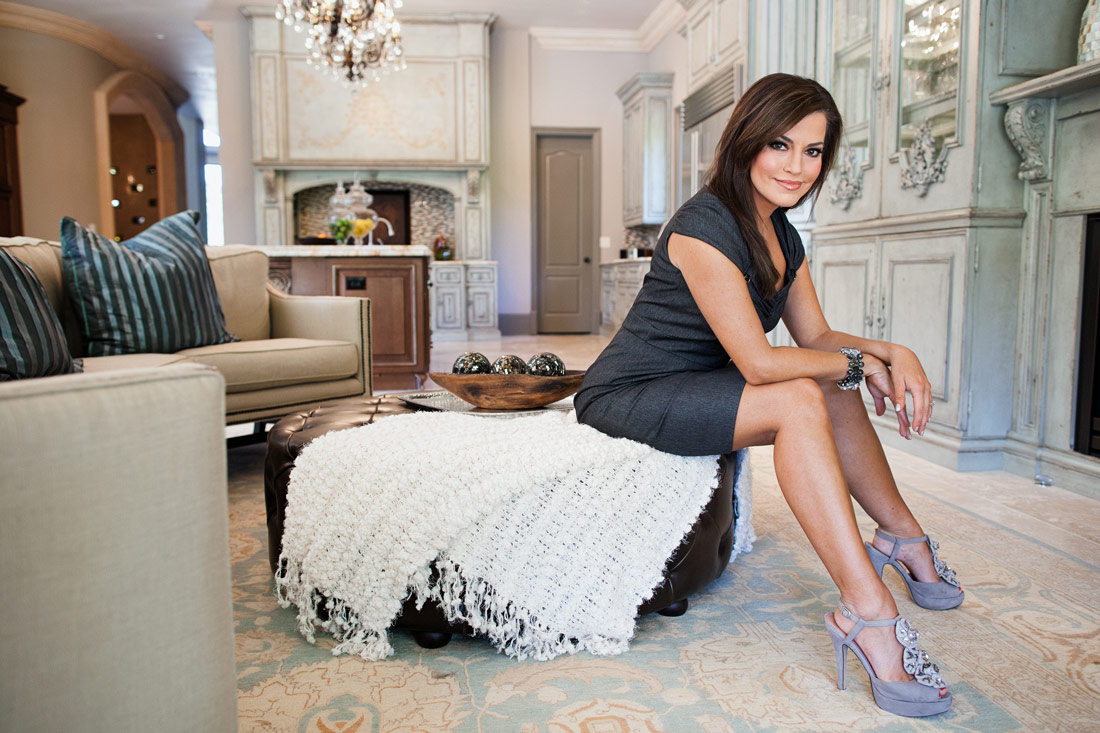
“I don’t want to do photography just for personal gain and pleasure—I want it to mean something. Whether it’s through the photographs I take or my connection to other photographers, I want to help other people along the path.”
Do you feel a responsibility to contribute to something bigger than yourself?
Yes, I do. First and foremost, I want to make sure that my family is taken care of and that the bills are paid, but I also want to put my mark on the world. It’s not going to be a massive mark that a president or rock star might leave, but I’ve discovered that I can use photography to help people. About a year or so into starting my photography business, I had a realization. I was barely staying alive and I also had some friends around me whose lives were falling apart—their marriages were crumbling or they’d been laid off. Here were some really close friends of mine who were struggling, and I couldn’t help them—I didn’t have any money to give them and I didn’t have a car to loan them. I realized that I needed to expand my business so that not only could I take care of myself, but I could help the people around me, too. I felt as though I was given a small lot of land to till and cultivate and I needed to make it larger so that I could feed more people. Since then, my personal business has grown to the point where it has kept about 12 people employed.
I don’t want to do photography just for personal gain and pleasure—I want it to mean something. Whether it’s through the photographs I take or my connection to other photographers, I want to help other people along the path. I’d like to be at least a footnote in the history book of photography. I don’t need a whole chapter; I just want my name in the index somewhere (laughing).
Are you creatively satisfied?
No, I’m not. If I were to embody creative satisfaction, it would be a carrot dangling in front of me. Right now, I’m doing what I wanted to be doing 10 years ago and I’m still not satisfied. It’s not because I’m not content with what I have, but it’s because I want to go deeper down the rabbit hole.
Any time I look through my work, I want to trash it all and go shoot new stuff. I usually love my work for about 48 to 72 hours, but after that, I start to pick it apart. At first I’ll say, “This was the greatest shoot I’ve ever had!” Three days later, I’ll look back at it and think, “Oh man, I really blew that (laughing).” I’m satisfied about being a full-time photographer, being able to take care of my family, and getting to do some interesting things, but creatively, no, I’m not satisfied. Part of me believes that I’m finally becoming the tortured artist who I didn’t want to be while I was at UGA.
I’m not sure if I’ll ever be creatively satisfied and I don’t think I want to be, either. I want that to always be just out of reach. I think about an artist like Jack White in It Might Get Loud—I could cry whenever I watch that film. He talks about wanting to fight, to struggle with creativity, and that speaks to me. I hope I keep chasing and don’t give up.
That said, is there anything that you’re interested in doing or exploring in the next 5 or 10 years?
I want to shoot more 8×10 film. Eventually, I want get my basement cleared out, put some plumbing in, and get a darkroom down there, because I’d like to shoot some large format film and process it myself. I don’t want to get back into film—35mm is dead to me—but nothing touches 4×5 and 8×10. I want to pull out some old cameras, shoot some personal portrait projects, process it myself, and get my hands dirty—I want to experience that tactile part again. I want to come out of my basement stinking of fix, because it’s been far too long since I’ve had the smell of chemistry wafting off of me.
Street art has also been a big visual influence on my life for the last three or four years and has moved into my work in subtle ways. I’m no Banksy, nor do I want to be, but I do love street art. I also want to travel to the major cities of the world—with populations of 10 million people or more—and shoot street photography. I love doing that and, in some ways, it saved my photographic life recently. But I also have to keep the lights on and keep food on the table, so whatever work comes my way—bands, CEOs, little advertising gigs, whatever—I’m going to take it.
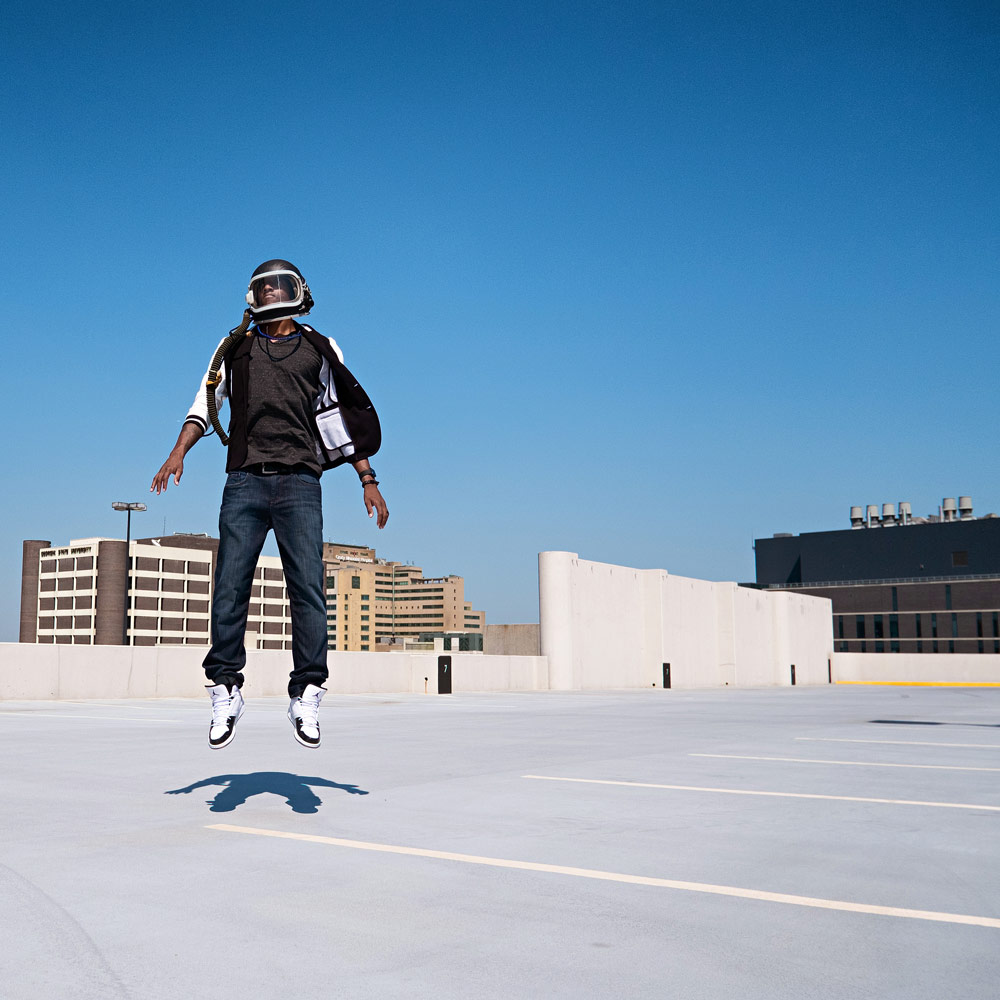
“It’s important to be plugged into a community around you, whether that’s online or in person, because without that, you’re an island out there on your own. My online community is just as valuable and fulfilling as the community I’m physically a part of.”
If you could give advice to a photographer who is just starting out, what would you say?
Stay out of debt. That’s number one. In the professional sense, hire an accountant on day one. You’ll say that you can’t afford to have one, but I’m here to tell you that you can’t afford not to have one. Find someone to help you with your books, accounting, and taxes from the very start. I didn’t do that in the beginning. I got behind on taxes and created a financial mess for myself because I’m disorganized and flighty, and I wasn’t dealing with my business correctly. So, on day one: buy a camera, then leave the camera store and immediately go hire an accountant. And maybe even hire an accountant and then go buy your camera (laughing).
I would also tell people to keep things very simple in the beginning. I see photographers try to be everything to everyone and their photography becomes very fragmented because they’re trying to shoot portraits, families, weddings, commercials, bands, live shows, and fashion all at the same time—and they don’t do any of it well. Instead, you need to say to yourself, “I want to shoot portraits or whatever,” and just stay focused on portraits.
And it’s not about the gear. Don’t ever believe that it’s about getting that new lens or camera—none of it is ever going to make you a better photographer. You have to become a better photographer first, then you can get the gear. If you have a basic camera, a couple lenses, a flash, an umbrella, and a reflector—you’re pretty much good to go. If you can’t make it happen with that, then you can’t make it happen.
How does living in Atlanta impact your creativity?
My family and I live in Decatur, which is just outside of downtown Atlanta. The best thing is that Atlanta is a big city—there are about 5 million people in the metro area—but there’s still a small-town kind of feel. There are a lot of opportunities for people to be a big fish in a little pond with whatever they want to do.
Living near an airport like Hartsfield-Jackson is really good, too. It’s an important hub that allows me to go anywhere in the world quickly and at a fairly good price. Twenty minutes out my front door and I’m able to fly to shoots, teaching opportunities, meetings, or whatever I need to do. It also brings in major touring artists and musicians all the time. The state of Georgia put in a big tax credit for filmmaking in the last few years, so we’re also getting a huge influx of film work coming into town. Things like that help the culture of our city. We’re not the most artistic place in the world by any means, but neighborhood by neighborhood, it’s a really great town to live in.
Is it important to you to be a part of a creative community?
It is. Here in Atlanta, the photo industry is close and there’s no shit-talking. I can call just about anyone up on the phone if I’ve got a question. We all get along really well and talk about jobs we did, gigs we did and didn’t get, or if we were able to get better terms on a contract than what was initially offered.
It gets lonely being a freelancer because you don’t really have anyone to talk shop with, bounce ideas off of, or help you with things. It’s important to be plugged into a community around you, whether that’s online or in person, because without that, you’re an island out there on your own. My online community is just as valuable and fulfilling as the community I’m physically a part of.
What does a typical day look like for you?
A typical day is me getting up at about 7am, making a cup of coffee, and getting the boys up. We have four boys—ages four to fourteen—who we have to get to four different schools each morning. I usually handle the morning routine while my wife handles the afternoons. I get the boys fed, dressed, and dropped off wherever they need to be.
Once I get to my studio, I make more coffee and turn some music on. These days, it’s usually hip-hop, or some 1980s new-wave punk or goth. I have a studio manager, Lani, who is awesome and helps me deal with getting ready for shoots or doing post-production. Actually taking pictures is only about 10% of my job; I mostly deal with stuff like email, paperwork, and meetings.
Whenever I’m in town, I always try to be home for dinner. I try to keep normal hours, so I usually work about 9am to 6pm. We sit down as a family around the dinner table, and every night we do a thing called “Best Part, Worst Part:” it’s where everyone around the table has to talk about the best part of their day and the worst part of the their day. Then it’s get the little ones to bed by 9pm, and yell at the big ones to get their chores done. I usually go to bed around midnight or 1 o’clock in the morning and then I get up and do it all over again.
Tina: Speaking of that, I saw the portraits of your family by David E. Jackson and they were phenomenal.
Yeah, David is a dear friend of mine who shot those for us about three years ago. And that’s still us, just a little older (laughing).
You mentioned the music you play in your studio. Do you have any albums on repeat right now?
Kendrick Lamar’s new album, good kid, m.A.A.d city, is my favorite new hip-hop album. It’s been on constant repeat for a week. I’ve also been listening to a lot of Glen Hansard and the Frames, Brother Ali, and The Dead Weather—I actually kind of have a really inappropriate crush on Jack White (laughing). If I had to make a top ten list, he would be the number one person I want to take a portrait of in my life—but yeah, that’s kind of what I’ve been playing on Spotify these days.
Actually, I don’t know how I feel about Spotify. I pay $10 a month and get all the music I want, but the whole time I’m thinking, “Are these musicians getting any money at all?”
Tina: It’s interesting that you bring that up. Many of the musicians we’ve interviewed have basically said that they can’t count on making money off music anymore, so they’ve had to figure out other ways to do it.
Ryan: Actually, Thom Yorke just pulled his music off Spotify to make a statement about digital music-sharing platforms like that.
I’m not surprised. I always think to myself, “Why are musicians on this? They can’t be making any money.”
Do you have any favorite movies or TV shows right now?
Schindler’s List is my all-time favorite movie. It taught me that the substrate of film can change lives and tell stories. I saw it about two weeks before I started at Gwinnett Tech. At the time, I was still wondering what I wanted to do with photography, and after I watched that movie I thought, “It’s almost like they took a camera back in time and told a story.” And then it hit me: told a story (laughing). I didn’t know shit about photography, and it made me say, “Wow! You can do that with a camera!” I had no idea how deep this rabbit hole went. I’ve been falling down it for 16 years, and I still have no clue where the bottom is because there’s still so much to learn.
I love Craig Brewer; Hustle and Flow is one of my favorite movies. I also really like Oh Brother, Where Art Thou?, Raising Arizona, and Airplane. And then just last night, my son said, “Dad, you’ve got to see A Town Called Panic.” It’s an amazing claymation film. It’s tough, though, because while I’m trying to teach my kids not to do drugs, that movie must have been made by a bunch of people on drugs (laughing). You watch it and think, “These were not sober people who made this (laughing).”
As far as TV goes, I don’t really keep up with it. I’ve never seen a single episode of Mad Men, or Boobs and Battles—err, I mean, Game of Thrones (laughing). My family and I got into Downton Abbey for a while, but normally I don’t watch a lot of television. By the time the kids go to bed, I’m hanging out with Meg or answering questions on my Q&A blog. My free time is usually spent on the Internet doing something.
Do you have a favorite book?
The book I just wrote! Photography Q&A: Real Questions. Real Answers. is now available on Amazon for $17 (laughing)! No, the joke around here is, “The guy who can’t read just wrote a book.” I have never been much of a reader; I just don’t have the attention span for it. This year, however, I did start reading an amazing book called Shadow of the Wind by Carlos Ruiz Zafón.
As far as books about photography go, my favorite is David duChemin’s VisionMongers. I think it should be required reading for all photographers—it’s absolutely fantastic. I’m really looking forward to Gregory Heisler’s 50 Portraits, which will be coming out in October, along with the new Dan Winters’s America: Icons and Ingenuity book. And I have all of Richard Avedon’s books. He’s a big influence.
Every now and again, I like to browse through Blurb’s store and buy some books. There are some really amazing diamonds in the rough, and I feel like tomorrow’s Annie Leibowitz is on there, making little photo books. I’ll buy someone’s book because I think their work is great, then someday when they get big I’ll have one of the only copies of their books in existence (laughing). Can you imagine if Annie Leibowitz had said, “Yeah, I made these 12 photo books back in the 1960s when I was just starting to shoot for Rolling Stone, and they’ve never been seen again.” Do you know how valuable one of those books would be today? So that’s my retirement package right there (laughing).
Any favorite foods?
Steak. I could eat it every day, for every meal. Steak salad, steak and eggs, steak and steak (all laughing). I also love sushi, but I’m kind of a lame sushi-eater. As long as it’s got cream cheese and avocado—American sushi, you know?—I love it.
What kind of legacy do you hope to leave?
I don’t know, but I often think that I’m going to end up like Richard Dreyfuss in Mr. Holland’s Opus. Mr. Holland had an opus that he wanted to write and he was going to be a big musician. Then he got married, started a family, and needed to make some money, so he got a job at a high school teaching music. And that just sort of became his life. Twenty or thirty years go by, and he never does what he set out to accomplish. But when he’s getting ready to retire from teaching, all of his students from years past come together and perform his opus for him. So his opus was actually these kids—his students.
When I got back into photography about 10 years ago, I was shooting musicians and artists, and I put a top-of-the-mountain goal up: I want to shoot a cover for Rolling Stone magazine. I’ve been plugging along for 10 years now and I still haven’t shot the cover of Rolling Stone, but it’s still something I want to do. That being said, I’m fully prepared for a day when I get an email from somebody that says, “Hey Zack, I went to one of your workshops years ago. I just shot my first cover of Rolling Stone and I wanted to thank you.” I feel like I’m going to be a Mr. Holland’s Opus kind of character, but I think I’m okay with that.
I took a break from teaching at one point because I thought, “I’m teaching too much and not shooting enough.” I’m a photographer, dammit, and I want to shoot pictures. That’s what I want to go down doing, but sometimes I feel like the thing I do best is helping other photographers. I struggle with that, but ultimately I think that’s how I’m going to go down: helping other people. And that’s not a bad thing.
As long as my family is taken care of, my wife is covered, and my family knows I love them, then I’m good with whatever it is I get to work on. I shouldn’t complain: I’ve got a good life.
A Hijacking from Zack
I’ve been interviewed a number of times for blogs, magazines, podcasts, and the like. Never in my life have I seen such attention to detail, research, and fact checking as I have seen with Tina & Ryan with TGD. You two are un-effing-believable. I wish I could hire you. I really do.
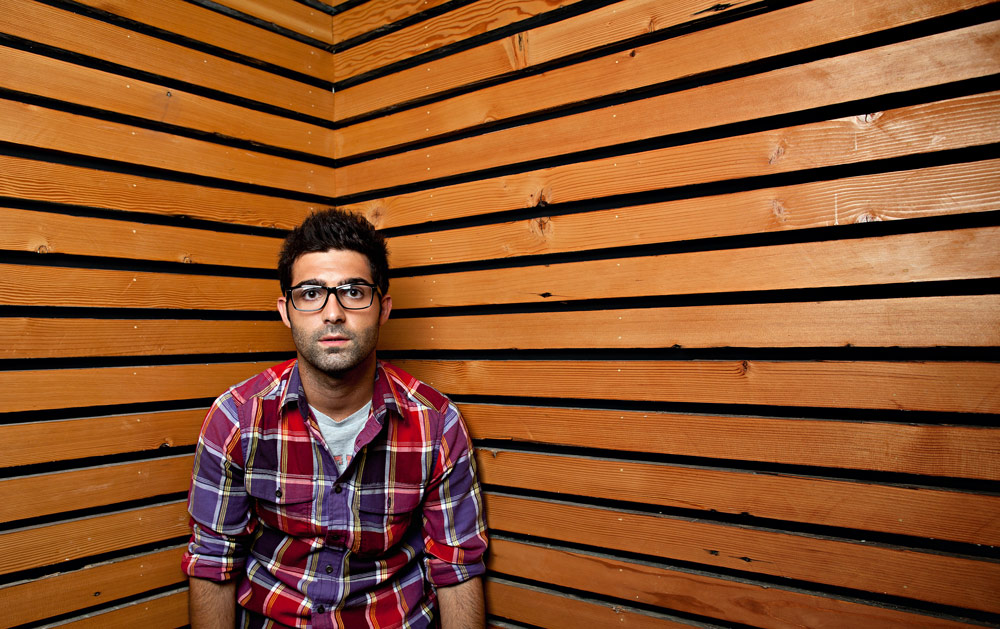
“I’m a photographer, dammit, and I want to shoot pictures…but sometimes I feel like the thing I do best is helping other photographers. I struggle with that, but ultimately I think that’s how I’m going to go down: helping other people. And that’s not a bad thing.”